The Best of World Cup 1959: Brazil take first title - outside, USA advertise for players
Brazil captured their first FIBA Basketball World Cup trophy at the third edition which was held in Chile in 1959. Brazil defeated Chile in the decisive final game, giving USA second and Chile third place.
MIES (Switzerland) - Brazil captured their first FIBA Basketball World Cup trophy at the third edition of the event which was held in Chile in 1959 - outside. The Brazilians defeated hosts Chile in the decisive final game, resulting in USA taking second place and the third spot on the podium going to Chile. Soviet Union actually would have claimed the championship but their victories were rescinded after they withdrew from playing Formosa.
The best team: Brazil
| Rank | Team | W-L |
| 1. | Brazil | 7-2 |
| 2. | USA | 7-3 |
| 3. | Chile | 2-4 |
| 4. | Formosa | 4-5 |
| 5. | Puerto Rico | 3-6 |
| 6. | Soviet Union | 7-2 |
| 7. | Bulgaria | 5-4 |
| 8. | Philippines | 4-2 |
| 9. | Uruguay | 2-4 |
| 10. | Argentina | 3-3 |
| 11. | United Arab Repulbic | 1-5 |
| 12. | Canada | 3-3 |
| 13. | Mexico | 0-6 |
The World Cup, known as the FIBA World Championship at the time, was supposed to be played in the fall of 1958, but delays in construction of Santiago's Metropolitan Indoor Stadium led the event to be played January 16-31, 1959. The Estadio Nacional de Chile, a soccer stadium, was converted for the Final Round to accommodate 16,000 spectators and the games were played outdoors.
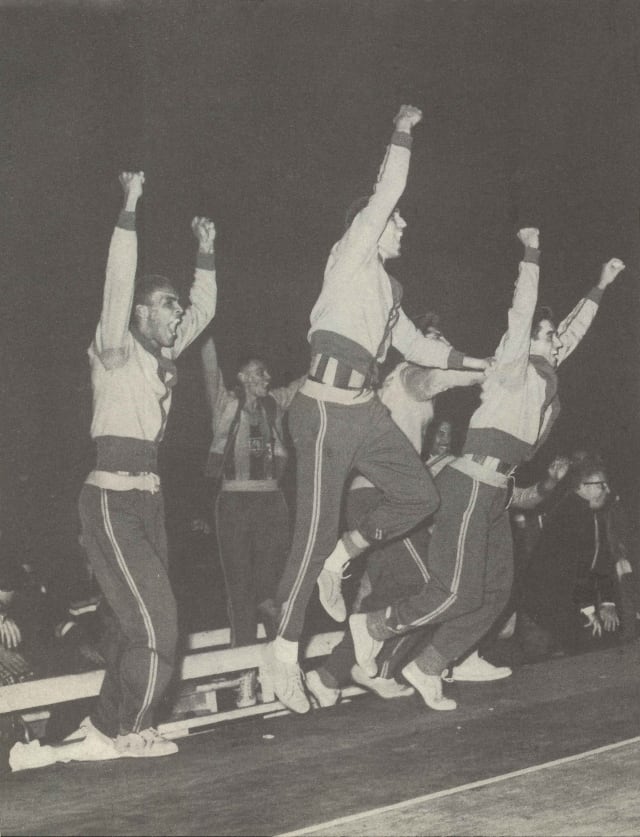 Brazil celebrating
Brazil celebrating
Thirteen teams participated: hosts Chile; Olympic champions USA; the top two teams from the South American Championship - Brazil and Uruguay; the top two from the European Championship - first-timers Soviet Union and Bulgaria; and the septet of invited nations Argentina, Canada, Mexico and Puerto Rico from the Americas and Formosa, Philippines and United Arab Republic (the official name of Egypt between 1958 and 1971) from Asia.
Chile were given a bye directly to the seven-team Final Round while the other 12 teams were divided into three groups of four, with the top two finishers joining hosts Chile to decide the title. USA and Bulgaria won their respective groups with 3-0 records and were joined by Formosa and Puerto Rico respectively while Brazil and Soviet Union emerged from a three-way tie at 2-1 in Group B - with Canada dropping to the Classification Round despite beating Soviet Union 63-54.
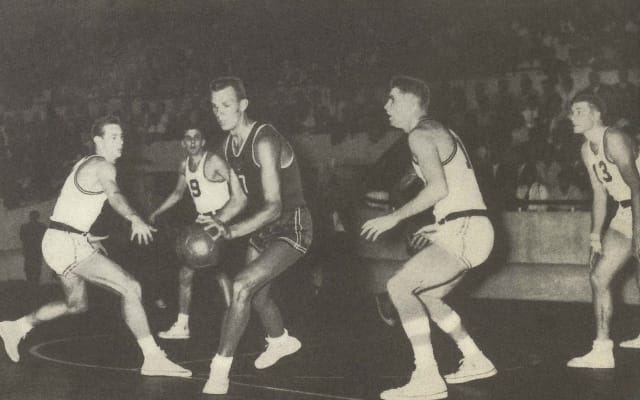 Canada in win over Soviet Union
Canada in win over Soviet Union
In the Final Round, Soviet Union raced away to five straight wins. For political reasons, Moscow decided against the Soviet Union and Bulgaria teams playing against Formosa. Formosa won the games via forfeit, placing Soviet Union and Bulgaria in the bottom of the standings.
Brazil's only two losses were to Soviet Union and ended up claiming the title as they ended up 4-0 in the Final Round, rolling past Chile 73-49 in the final decisive game. United States finished second with a 3-1 mark in the final group, losing to Soviet Union and Brazil while Chile took third place with a 2-2 Final Round record. Chile actually could have hoisted the trophy had they beaten Brazil by 12 points - which would have resulted in a three-way tie with USA.
The best player: Amaury Pasos - MVP
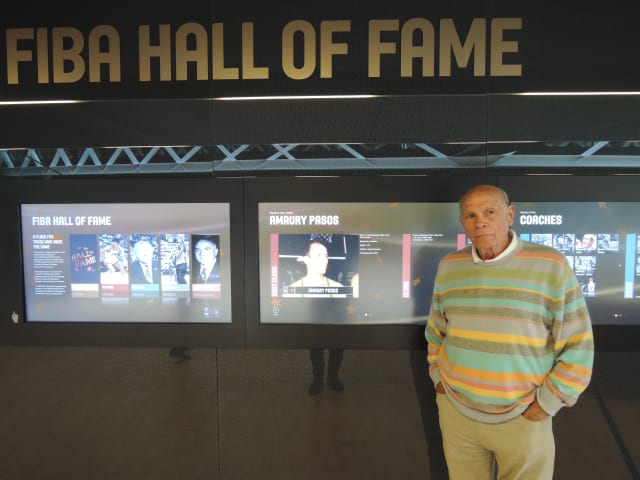
Brazilan Amaury Pasos was named as the tournament's MVP as the team's second-leading scorer with 15.2 points per game. The FIBA Hall of Famer scored 22 points against Formosa and then poured in 24 points in a tight 66-63 Final Round loss to Soviet Union before scoring 16 points in each of the last two games against USA and Chile.
Joining Pasos on the All-Tournament Team were Brazilian teammate Wlamir Marques, Juan Vicens of Puerto Rico, Bulgaria's Atanas Atanasov and Janis Krumins from Soviet Union.
The best story: USA finish second after advertising for players
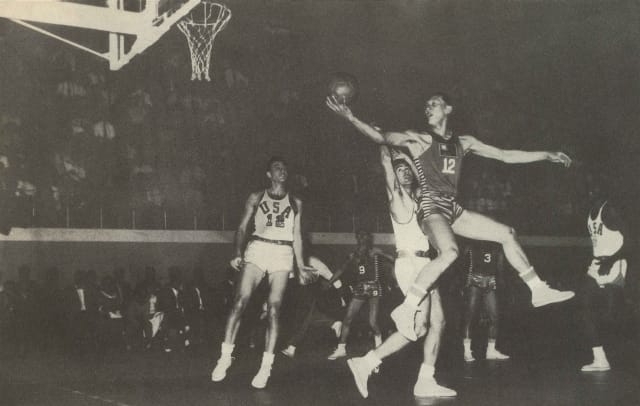
The delay of the World Cup from autumn 1958 to January 1959 caused a major problem for USA as it was right in the middle of the regular basketball season in the country, meaning neither Amateur Athletic Union (AAU) teams - which represented USA in the first two World Cups - nor collegians would be available. USA initially declined to participate but they finally agreed to send a squad from the Air Force.
An advertisement for volunteers appeared in an Air Force newspaper and 24 players appeared at Andrews Air Force Base in December 1958 for tryouts. The final team did not include any player taller than 6ft 5in (1.95m) and two of USA's top players Robert Jeangerard and Eddie White were injured one day before leaving for Chile.
USA still managed to sweep through the first group stage and grab wins over Bulgaria, Puerto Rico, Formosa and Chile in the Final Round. USA were beaten 62-37 by Soviet Union and 81-67 by Brazil to grab second place.
The best game : Chile vs Formosa
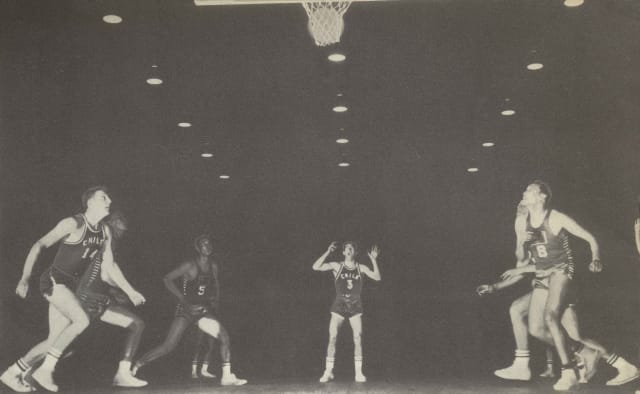 Chile versus Formosa
Chile versus Formosa
The first game of the Final Round was the opening contest for hosts Chile, who were given a bye past the Preliminary Round. It wound up being the decisive game for Chile to collect a spot on the podium for the second time in three editions - grabbing third in the inaugural World Cup in 1950.
Chile were leading Formosa 35-27 at halftime but the game was tight at regulation and ended up even 71-71 after 40 minutes, sending it to overtime. Both teams were hit with major foul trouble, Chile losing five players, including Juan Thompson and Rufino Bernedo, who combined for 47 points.
The hosts still had six players though. Formosa had six players foul out and finished the game with four players - one of them James T.L. Chen, who scored 30 points and kept the team in the game. The victory ended up being the difference between third and fourth place in the final standings.
The best performance: Jerry Vayda
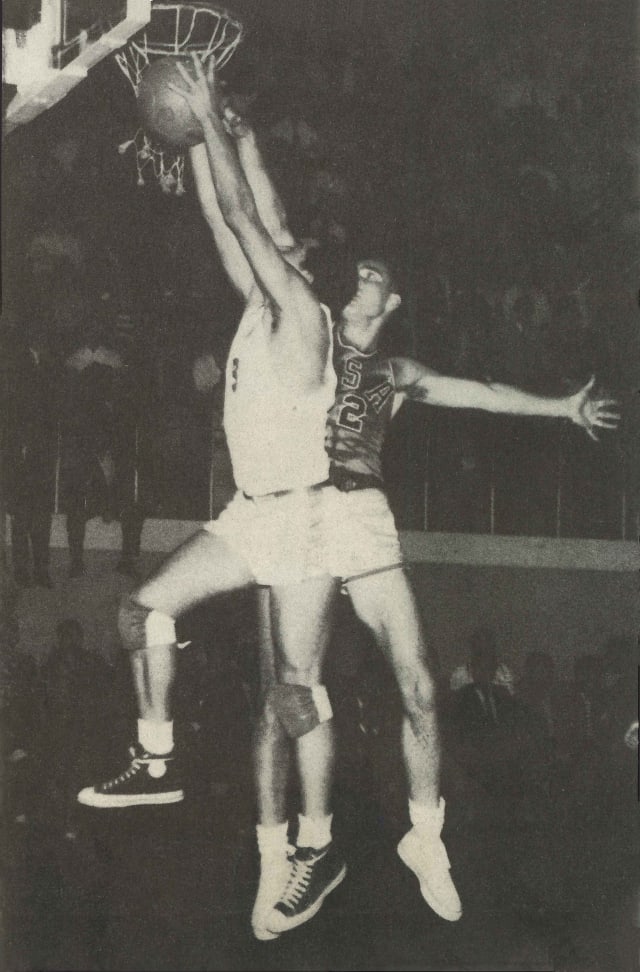 Jerry Vayda (No. 12 - USA)
Jerry Vayda (No. 12 - USA)
The 30 points by James T.L. Chen nearly was the best performance, but that went to Jerry Vayda from United States. The Americans were playing United Arab Republic in the final game of the Preliminary Round and Vayda was unstoppable as he scored 31 points in a 103-58 victory.
Stats leaders
Scorers
| Player (country) | Points Per Game |
| James T.L. Chen (Formosa) | 20.1 |
| Juan Vicens (Puerto Rico) | 19.8 |
| Wlamir Marques (Brazil) | 18.6 |
| Jerry Vayda (USA) | 18.0 |
| Lio Jin-Ron (Formosa) | 16.7 |
| Dick Welsh (USA) | 16.4 |
| Victor Radev (Bulgaria) | 15.3 |
| Loreto Carbonell (Philippines) | 15.3 |
| Amaury Pasos (Brazil) | 15.2 |
| Rufino Bernedo (Chile) | 15.0 |
FIBA